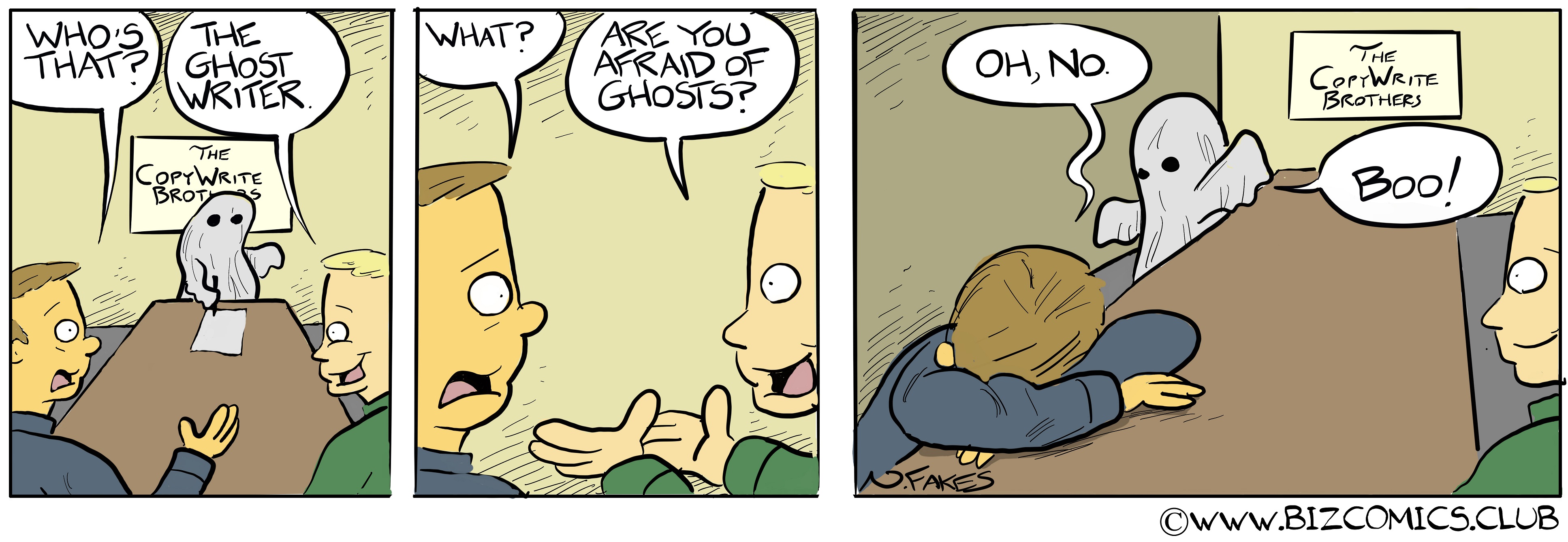Ghostwriters and Other Hobgoblins

We recently went to visit a client who’d hired us to create cartoons for a speech he was scheduled to give. To accompany his speech, he wanted to use the cartoons, as slides, to illustrate a series of points he intended to make.
When he asked us to meet him at his home, rather than at his office, it struck as a bit odd. But ever the troupers, we decided location was the least of the matters at hand. So, we dutifully drove to his place of residence.
Upon our arrival, we were greeted at the door by his wife. She cordially invited us to come in. We entered the spacious foyer and looked around. Nice place. But no client. We inquired of his whereabouts.
“He’s upstairs.”
“Oh, does he have an office up there?”
“No,” she replied. “He’s hiding under the bed.”
Glancing at each other warily, we asked, as one: “Why?”
Her flat response: “He’s afraid of ghostwriters.”
After coaxing him out from under the bed with a cookie and assurances that we weren’t ghostwriters, we settled the client down. At a point at which he was composed enough to be capable of some basic conversation, he explained he was terrified of public speaking. So, he’d hired a ghostwriter to draft his remarks. Then he remembered that the only thing he was more afraid of than public speaking was ghosts. When we rang his doorbell, he thought we were the ghostwriter, panicked, and hid under the bed. We offered him the following explanation:
First of all, actual ghosts wouldn’t have rung the bell. They’d have passed right through the door or a wall or whatever they felt like passing through. Second, ghostwriters aren’t actual ghosts; although (we had to admit), some of them can be scary in their own rights. Third, ghostwriters are people who write material (for speeches, books, scripts, et al.) for other people. And those other people are credited with being the authors of the material.
Seemingly satisfied and noticeably more calm, the client asked the derivation of the term, ghostwriter. We explained that the first recorded instance of ghostwriting dated back to 1611 and an incident that took place in Mallaig, a village in the the Scottish Highlands.
One day, Angus McFife, the village blacksmith, asked his wife, Begonia, to accompany him on a walk to Mallaig Harbor. On their arrival, he asked her to put his anvil in her apron pocket. Then he pushed her off the pier. Begonia’s ghost, so angered that Angus had been stupid enough to kill her before taking out any life insurance on her, wrote a full confession, signed Angus’s name, and left it on the desk of the local constable. Angus was sentenced to life in prison with Begonia’s twin sister.
When we left, the client was back under the bed. But we did a lovely job on his slides.
This content is available for syndication. Please contact us for details.

0 Comments